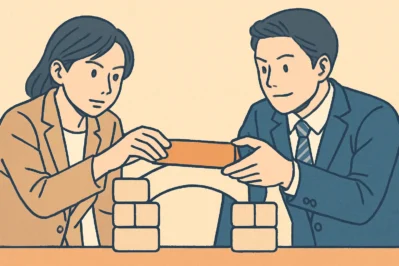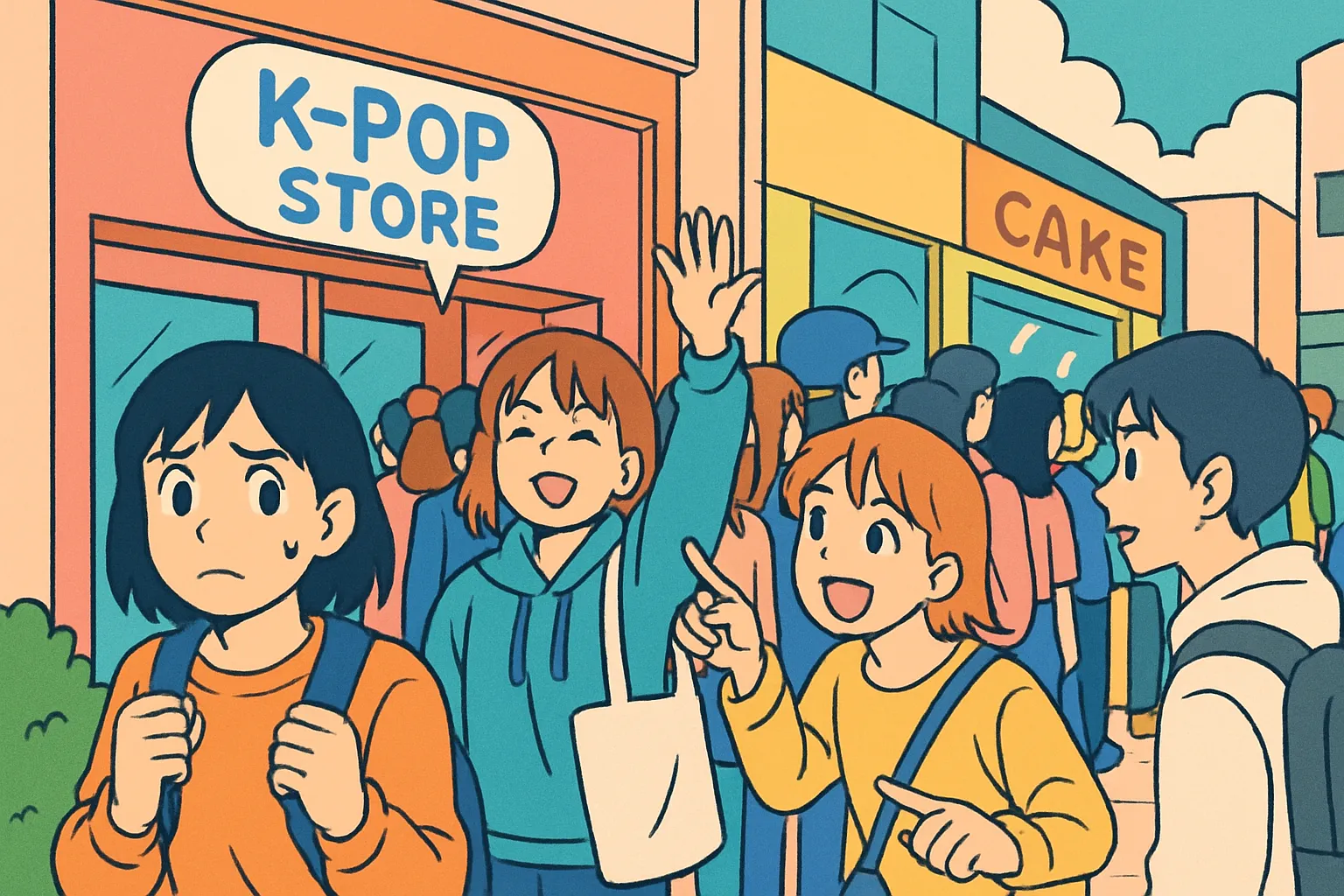The Key to Korean Business: Mastering ‘Gwan-gye’ (관계)
Hello! This is [Maeil Hangeul], here to upgrade your Korean skills to the executive level!
Are you preparing to work with a Korean company or enter the Korean market? Then today’s lesson is an absolute must. We’re going beyond textbook phrases and diving deep into the core philosophy that drives Korean business: the relationship-first approach. Lately in Korea, as global ventures and cross-cultural collaborations are booming, understanding this intricate cultural etiquette isn’t just helpful—it’s the unspoken rule that can secure a partnership or quietly end negotiations. Forget the “get straight to the point” mindset for a moment; in Korea, the person is more important than the paper.
Core Expressions for Building Business Relationships
Here are the essential phrases you need to understand and use to navigate the Korean business world like a pro.
1. 신뢰를 쌓다 (Shinroe-reul ssat-da)
* Pronunciation [Romanization]: [sin-lwe-reul sat-ta]
* English Meaning: To build trust.
* Detailed Explanation: This is the foundational goal of all business interactions. The verb ‘쌓다’ (ssat-da) literally means “to stack” or “to pile up.” This perfectly illustrates the Korean perspective: trust isn’t instantly given, but rather built up layer by layer over time through consistent, positive interactions. This process often takes place outside of the boardroom, over meals or informal gatherings. It’s the essential prerequisite for any significant business transaction.
2. 안면을 트다 (Anmyeon-eul teu-da)
* Pronunciation [Romanization]: [an-myeon-eul teu-da]
* English Meaning: To break the ice; to get acquainted.
* Detailed Explanation: This is a fantastic idiomatic expression. ‘안면’ (anmyeon) means ‘face,’ and ‘트다’ (teu-da) means ‘to open up’ or ‘to clear a path.’ So, you are literally “opening faces” with each other. It signifies the very first step of a relationship, moving from complete strangers to acquaintances. Before you can even begin to build trust, you must first ‘open faces.’ This is why initial meetings in Korea may feel more personal and less business-focused than you might be used to.
3. 인맥을 넓히다 (Inmaek-eul neol-pi-da)
* Pronunciation [Romanization]: [in-maek-eul neol-pi-da]
* English Meaning: To expand one’s personal network/connections.
* Detailed Explanation: ‘인맥’ (inmaek) is a concept that goes deeper than the English word “network.” It refers to a web of human connections built on mutual trust and, often, a sense of shared obligation. It’s not just about who you know, but about the quality and strength of those relationships. ‘넓히다’ (neol-pi-da) means ‘to widen’ or ‘to broaden.’ In Korea, a strong ‘인맥’ is considered a significant asset, both personally and professionally, as these connections are the channels through which business opportunities often flow.
4. 끈끈한 관계 (Kkeun-kkeun-han gwan-gye)
* Pronunciation [Romanization]: [kkeun-kkeun-han gwan-gye]
* English Meaning: A close-knit, strong, or “sticky” relationship.
* Detailed Explanation: The adjective ‘끈끈하다’ (kkeun-kkeun-hada) means “to be sticky.” While it might sound odd in English, in this context, it describes the ideal business relationship in Korea: one that is resilient, loyal, and long-lasting. It implies a bond that isn’t easily broken by minor disagreements or market fluctuations. Achieving a ‘끈끈한 관계’ with a business partner is a sign of ultimate success in relationship-building.
Example Dialogue
Let’s see how these expressions play out in a conversation between a department head (Kim Bujangnim) and a senior manager (Park Daeri).
A (Kim Bujangnim): 박 대리, 새로 시작한 ABC사와의 프로젝트는 어떻게 진행되고 있습니까?
(Park Daeri, how is the new project with ABC Company progressing?)
B (Park Daeri): 몇 차례 미팅은 가졌지만, 아직 공식적인 계약 논의는 조심스러운 분위기입니다.
(We’ve had a few meetings, but the atmosphere is still cautious when it comes to formal contract discussions.)
A (Kim Bujangnim): 그렇군요. 우리가 먼저 신뢰를 쌓는 게 중요합니다. 계약서에 서명하기 전에, 사람 대 사람으로 안면을 트는 과정이 필요해요.
(I see. It’s important that we build trust first. Before signing any contracts, we need a process of getting acquainted as people.)
B (Park Daeri): 알겠습니다. 저녁 식사 자리를 마련해서 비공식적인 대화를 나눠보는 것이 좋을 것 같습니다. 그래야 더 끈끈한 관계로 발전할 수 있겠죠.
(Understood. I think it would be good to arrange a dinner to have some informal conversation. That way, we can develop a stronger relationship.)
A (Kim Bujangnim): 좋은 생각입니다. 이번 기회를 통해 IT 업계에서 우리의 인맥을 넓히는 것도 중요하고요.
(That’s an excellent idea. It’s also important to use this opportunity to expand our network in the IT industry.)
Cultural Tip & Trend Analysis
The ‘Hwesik’ (회식) Connection: The culture of company dinners, known as ‘회식’ (hwesik), is a primary arena for ‘신뢰를 쌓다’ (building trust). While recent trends among younger generations are shifting towards shorter and less frequent hwesik, the underlying principle of bonding outside the office remains a powerful tool in Korean business. If you are invited, participating enthusiastically is a clear signal that you value the relationship.
Warm Intros > Cold Calls: In the West, a direct approach or “cold call” can be seen as proactive. In Korea, however, leveraging your ‘인맥’ (inmaek) for a warm introduction is exponentially more effective. Being introduced by a mutually trusted third party instantly transfers a degree of credibility and significantly smooths the process of ‘안면을 트다’ (breaking the ice). Even in today’s digital startup scene, a personal introduction can open doors that a polished email never could.
Let’s Wrap Up & Practice!
Today, we learned that in Korean business, success is built on a foundation of strong personal relationships. Remember these key steps: start by 안면을 트다 (getting acquainted), then work diligently to 신뢰를 쌓다 (build trust) and 인맥을 넓히다 (expand your network), with the ultimate goal of forming a 끈끈한 관계 (a strong, sticky relationship).
Challenge Question:
1. Imagine you are meeting a potential Korean business partner for the first time at a dinner. What would be your primary goal for the evening, and which of today’s expressions best describes that goal? Why?
Share your answers and any thoughts on Korean business culture in the comments below! We’d love to hear from you.






